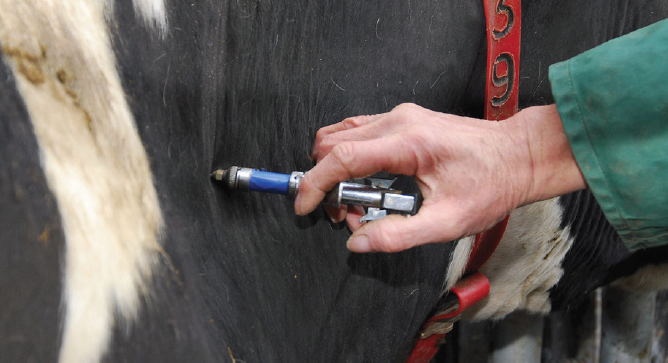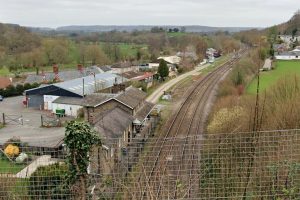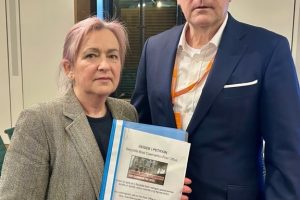 IT WAS TRAILED as a major announcement by the Cabinet Secretary for Rural Affairs, Lesley Griffiths, but reaction to the Welsh Government’s change of tack from having a failed strategy to talking about a different strategy was met with a decidedly mixed response from opposition parties and farming unions.
IT WAS TRAILED as a major announcement by the Cabinet Secretary for Rural Affairs, Lesley Griffiths, but reaction to the Welsh Government’s change of tack from having a failed strategy to talking about a different strategy was met with a decidedly mixed response from opposition parties and farming unions.
After the failure of its vaccination trial, which came to an end when international supplies of vaccine ran out, the Welsh Government has still not advanced any concrete plan to resolve the problem.
Instead, Lesley Griffiths announced a consultation.
Over the past 12 months, nearly 9,500 cattle have been slaughtered as a result of this disease, a 38% increase from last year.
The situation is even worse in endemic areas of the country, with Pembrokeshire suffering a 40% increase in slaughtered cattle, Carmarthenshire 78% and Clwyd an increase of 137% in the 12 months to July 2016 compared to the same period in the previous year.
Since January 1996, the number of animals slaughtered in Wales as a result of bovine TB has reached 118,488 animals – equivalent to 23% of the total number of adult cattle we have on farms across Wales today.
The Cabinet Secretary told AMs: “Our current programme for TB eradication in Wales comes to an end this year.”
In fact, the ‘current eradication programme’ ended in October 2015, when supplied of vaccine ran out.
When it came to the promise to ‘take stock, reflect on our successes, learn lessons’ towards a TB free Wales, there was very little in Ms Griffiths’ statement that suggested that among the lessons the Welsh Government was prepared to learn were those relating to the successful steps taken in New Zealand and the Republic of Ireland about control of the infection reservoir in wildlife.
Instead, the range of other options available will be considered, including learning from a pilot in Northern Ireland where badgers were cage-trapped and infected animals were humanely killed. Working with vets and wildlife experts, the Cabinet Secretary will consider whether a similar approach might be appropriate in high incidence areas where there is chronic herd breakdown and an objective confirmation that badgers are infected.
The conditional ‘might’ is significant.
The consultation is also seeking views on:
- Introducing a mandatory Informed Purchasing Scheme to help farmers make informed decisions about the health of the cattle they wish to purchase;
- Imposing compensation penalties for cattle moved within a multi-site restricted holding;
- Reducing the TB compensation cap from £15,000 to £5,000, which would not affect the majority of farmers but would result in around £300,000 a year savings.
Responding to the Welsh Government’s statement on Bovine TB, Preseli Pembrokeshire AM Paul Davies, who speaks for the Welsh Conservatives on Rural Affairs, welcomed the Welsh Government’s consultation on its ‘refreshed approach’ but believes it is a case of ‘too little, too late’.
He said: “Sadly, Labour’s measures to tackle the scourge of Bovine TB do not go far enough in eradicating this awful disease.
“There is a clear requirement for a more holistic approach and the Welsh Government’s strategy should include all the tools at its disposal to ensure we eliminate Bovine TB in both our cattle and wildlife population.

“The proposed regional approach to tackling this disease must ensure area risk-based strategies are not disproportionate to farmers and that farmers are not facing impossibly stringent controls.
“While some of the measures are welcome, it is imperative we see more decisive action from the Welsh Government as this disease is having a devastating impact on rural communities and Welsh farming.
“Farmers in Wales need to see an holistic TB strategy that learns from other countries and if necessary difficult decisions will have to made.”
Plaid Cymru’s Simon Thomas, Mid and West regional AM, said: “This announcement is a step forward towards a proper integrated strategy to tackle bTB. It is welcome that the link between the disease in wildlife and in cattle is being recognised and that measures are being taken to address the policy vacuum that has been in place. It needs to be ensured that the measures taken are targeted, effective and humane.
“Recognition that a regional approach is needed to tackle the problem is welcome. Instances of TB infection in cattle has stayed persistently high in west Wales and is increasing in new areas in Carmarthenshire.”
“I am calling for assurances that testing and movement restrictions will remain proportionate to the disease status of an area.”
In relation to the proposal to cap compensation, Simon Thomas said: “A cut of £10,000 from the current cap of £15,000 will be a cause of concern to many farmers.”
The Farmers’ Union of Wales has welcomed the Welsh Government’s announcement that it will consider a badger test-and-cull type approach to TB as a small step in the right direction, but says many farmers will be concerned at the implications of splitting Wales into TB zones.
The proposals, announced as part of a TB eradication programme consultation launched by Cabinet Secretary Lesley Griffiths on Tuesday (Oct 18), include splitting Wales into five regions – one ‘low TB’ area, two ‘intermediate TB’ areas and two ‘high TB’ areas, with differing approaches to eradication in each area.
NFU Cymru President Stephen James said: “In setting out her plans for dealing with chronic herd breakdowns, there is a welcome recognition from the Cabinet Secretary of the link between cattle and wildlife in disease transmission, but we are concerned at the time it may take for this issue to be adequately addressed.
“It is important to stress that Welsh Government’s low incidence area in North Wales has always had low levels of disease incidence and this new area should not be seen as a vindication of previous Government strategy.”
Stephen James concluded: “We have always said that we must use every option available to us, this includes; cattle testing, cattle controls, improving biosecurity, encouraging farmers to make informed purchasing decisions and strengthening the role that local vets play in tackling this horrendous disease. Any comprehensive TB eradication strategy must also actively remove infection from diseased wildlife across high incidence areas.
“Clearly, the proposals put forward by Welsh Government in today’s statement will ratchet up the control














Add Comment